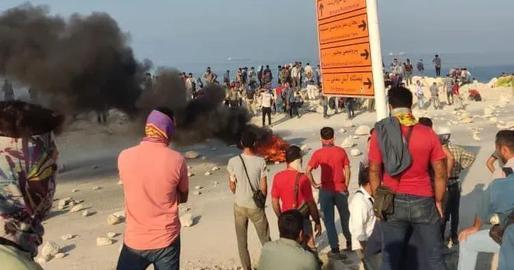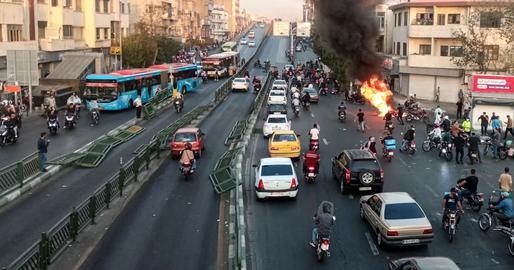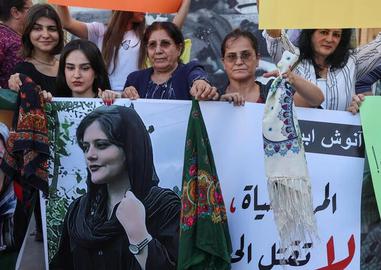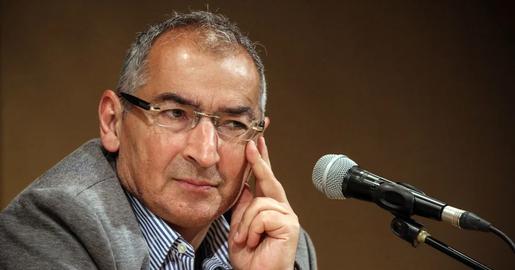Workers brought oil production to a standstill in a series of strikes at several sites across Iran, on Monday, as the latest battleground emerged in an escalating wave of protests that continue to sweep the country.
Videos published on Twitter, such as the below, show the striking crowds.
امروز ۱۸ مهر شروع اعتصابات و اعتراضات کارگران پروژهای شاغل در پتروشیمی بوشهر، عسلویه. #مهسا_امینی pic.twitter.com/cnWY7MMxkn
— +۱۵۰۰تصویر (@1500tasvir) October 10, 2022
The Council of Oil Contract Workers announced that more than 4,000 workers were striking, affecting sites on the Persian Gulf coast including the Bushehr, Borzovieh, Hemgan and Asaluyeh petrochemical refinery. The second phase of Abadan refinery and several companies were also hit by the action.
Workers of Asaluyeh petrochemical sites in southern Bushehr city refused to return to work, made makeshift defences of lines of rocks and rubble, and torched objects on the streets to prevent riot forces from reaching the scene.
In videos emerging from Bushehr, angry workers could be heard chanting "Death to the Dictator," “Death to Khamenei!” and “This year is the year of blood, Seyyed Ali Khamenei is done!”
"The proud workers of Asaluyeh blocked the roads and joined the strikes," a man is heard saying as hundreds of workers gathered outside the facility amid plumes of thick smoke.
The refinery and associated petrochemical industries at Asaluyeh are considered one of the most important economic infrastructures in Iran and a main source of revenue for the government. But the Council of Oil Contract Workers had warned the government last week they would go on strike if security forces continued suppressing the protests.
"We will stop working and join the people if you continue killing and arresting people in their protest against compulsory hijab," the council said in a statement.
"We, the workers of the oil projects, in unison with people in Iran, once again declare our anger and hatred towards the murder of Mahsa Amini at the hands of the morality police. We support the people's fight against organized crimes against women, and growing poverty," it added.
Widespread strikes have been reported in several cities across the country in recent days, especially in Kurdish towns where public outcry was sparked a nationwide protest after 22-year-old Mahsa Amini died on September 16, three days after she was arrested in the capital by Iran's morality police.
Traders in the Grand Bazaar, Lalehzar, Sepehsalar Garden, Tajrish Bazaar and Shiraz Bazaar in Tehran, as well as in markets in other cities in Kurdistan province and other Kurdish towns elsewhere, were already on strike.
“Nothing [bad] will happen to me if I don’t work for a few days. Even if we open our shops, people are not in a good economic situation, and we cannot sell anything,” a trader from Tehran’s bazaar told IranWire.
Iranian authorities have started a crackdown against workers’ rights activists and arrested at least two of them in the capital on Monday.
Intelligence forces stormed the houses of Asad Meftahi and Peyman Salem and moved them to an unknown location, rights groups confirmed Monday.
Unrest was reported early Monday from Sanandaj, the capital of Iran's Kurdistan province, as well as in the village of Salas Babajani near the border with Iraq. Footage showed heavy gunfire before dawn in the city.
According to reports received by IranWire from the provincial capital of Sanandaj over the weekend, government forces targeted protesters with tear gas and live ammunition. Several protestors were reported to have been killed and many others injured. A source described the city as "a war zone”.
The heavy presence of security forces in the Kurdish cities of Sanandaj, Saqqez and Divandareh was also reported on Monday.
Footage shared on social media showed protests in dozens of cities across Iran, with fierce clashes between protesters and riot police in cities and towns across Amini's native Kurdistan province.
There have also been reports about a deadly riot in Lakan prison, in northern Rasht.
“Today, several prisoners in Ward 8 of Lakan Prison in Rasht, who are sentenced to death, started fighting each other due to personal problems,” a local official said. “As the conflict between these people escalated, the fight spread to the prison corridor and the atmosphere in this part of Rasht prison became tense.”
Officials' account of the incident was in doubt on Monday as people reported a heavy presence of security forces around the prison and the city.
Authorities in Tehran did not acknowledge any disruption in the oil industry, but Tasnim news agency described the incident as a salary dispute.
Meanwhile, the United Kingdom issued sanctions against senior Iranian security and morality police officials, saying the force had used threats of detention and violence to control what Iranian women wear and how they behave in public.
“The UK has today sanctioned the morality police in its entirety, as well as both its chief, Mohammed Rostami Cheshmeh Gachi and the head of the Tehran Division, Haj Ahmed Mirzaei,” the UK government said Monday.
The UK’s list names five leading political and security officials in Iran for “committing serious human rights violations.” They include Gholamreza Soleimani, the head of the Islamic Revolutionary Guard Corps’ Basij force, who is responsible for internal security in Iran; Hassan Karami, the Commander of the NAJA Special Forces Unit of the Iranian national police; and Hossein Ashtari, the Commander-in-chief of the Iranian police.
“The UK stands with the people of Iran who are bravely calling for accountability from their government and for their fundamental human rights to be respected,” British Foreign Secretary James Cleverly said in a statement.
“These sanctions send a clear message to the Iranian authorities – we will hold you to account for your repression of women and girls and for the shocking violence you have inflicted on your own people,” he added.
At least 185 people, including at least 19 children, have so far been killed in the unrest.
visit the accountability section
In this section of Iran Wire, you can contact the officials and launch your campaign for various problems

























comments